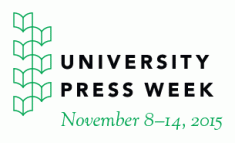November 9, 2015
University Press Week lauds nonprofit publishers
by Ena Brdjanovic
 Yesterday marked the beginning of University Press Week (UPW), a celebration of academic presses and scholarly writing presented by the Association of American University Presses (AAUP). UPW was first established by Jimmy Carter in 1978 to commemorate the centennial of Johns Hopkins University Press, the first university-affiliated press in the United States. Today, UPW underscores the value of nonprofit presses in a publishing environment that increasingly seems to favor Trump to Thoreau (or, grills).
Yesterday marked the beginning of University Press Week (UPW), a celebration of academic presses and scholarly writing presented by the Association of American University Presses (AAUP). UPW was first established by Jimmy Carter in 1978 to commemorate the centennial of Johns Hopkins University Press, the first university-affiliated press in the United States. Today, UPW underscores the value of nonprofit presses in a publishing environment that increasingly seems to favor Trump to Thoreau (or, grills).
The AAUP is utilizing this week to champion the work and influence of its 130+ member presses by highlighting the unexpected, and often under-appreciated, contributions of scholarly publishers. In addition to university-affiliated publishers, AAUP organizations include museums, academic societies, think tanks, research centers, and independent publishers, whose work constitutes an array of award-winning books across political and artistic schema, from the work of literary Nobelists to prized cookbooks. Throughout, the AAUP community will be using the hashtag #ReadUP to feature works published by university presses, as well as affiliated publishers, on social media.
They will also be hosting two online panels: the first, to be held on Tuesday, November 10, will focus on the reinvention of the academic press and will be produced in conjunction with Academic Book Week. The second panel will delve into the process of being published by an academic publisher, and will be held on Friday, November 13.
In a timely reveal, the association has also announced the opening of a Washington, D.C. office to be housed with the Brookings Institution, an AAUP member press. The AAUP will continue to maintain its long-held headquarters in New York City with Executive Director Peter Berkery dividing his time between New York and Washington. According to Berkery, the AAUP will utilize this second office to expand their impact “more broadly into scholarly communications, global higher education policies, and to the humanities and technology issues.”
Ena Brdjanovic is Director of Digital Media at Melville House.